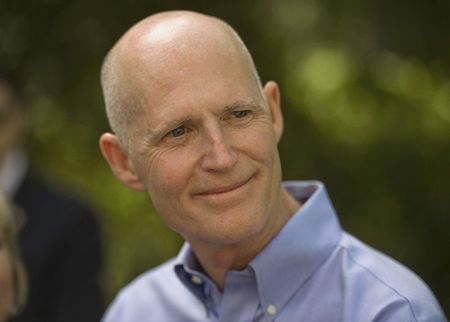By Bill Cotterell
TALLAHASSEE Fla. (Reuters) - Months of mud-slinging by Florida Governor Rick Scott and former Governor Charlie Crist have made voters distrust both men in a hot race that is too close to call, according to a new poll released Wednesday.
Six weeks before election day, the Quinnipiac University Poll found Republican Scott with support of 44 percent of likely voters, while 42 percent said they would vote for Crist, a former Republican running for his old job as a Democrat after he switched parties in 2012.
Independent candidate Adrian Wyllie, a libertarian who is on the ballot, drew 8 percent, which could prove decisive on Nov. 4.
Peter Brown, assistant director of the polling operation, said large numbers of voters trust neither Scott nor Crist.
"When fewer than four in 10 voters think both the Democratic and Republican candidates for governor are honest, you know this has to be one of the nastiest races in state history," Brown said in a statement announcing the poll results. "They have been throwing so much mud that they both are covered in it."
The governor's campaign, while touting job creation in the past four years, has battered Crist with TV ads about his past friendship with former Florida lawyer Scott Rothstein, who was convicted of investment fraud in a Ponzi scheme.
Crist, for his part, has hammered Scott with ads recalling the $1.8 billion in federal fraud fines paid by Columbia/HCA, the hospital corporation he ran before entering politics.
While Scott's 2 percentage point edge was within the poll's 3.1 point margin of error, Brown said, Scott led by 44 percent to 37 percent over Crist among independent voters.
Brown said Wyllie polled 11 percent among independents, and that the Scott-Crist race may depend on how many of those voters cast their ballots and whether they switch to the Republican or Democratic nominee.
"Mr. Wyllie is not competitive to win, but his voters could make the winner," Brown told a news conference, noting that minor candidates "tend to fade" as the election approaches.
"At this point, neither major party candidate is doing markedly better as a second choice of Wyllie voters," he added.
Brown noted that negative campaigning "tends to be a turnoff" for independents and third-party voters, like Wyllie's supporters.

The poll was conducted among 991 likely voters from September 17 to 22.
(Editing by David Adams, Chizu Nomiyama and Mohammad Zargham)
